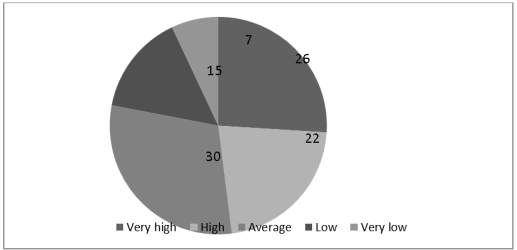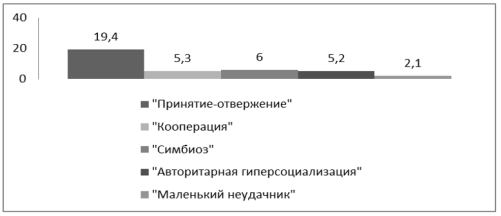This article presents the results of studying the influence of parental attitudes on the educational motivation of first-graders. The study showed that first-graders raised in families with the «acceptance» type of parental attitude have a higher motivation to study compared to schoolchildren raised in families with the «little loser» type of parental attitude.
Keywords: parental attitude; educational motivation; primary school age;first graders.
Since it is in primary school that the process of formation of educational activities and motives aimed at further education takes place, it becomes necessary to explore the ways and conditions for the formation of motivation of first-graders. Undoubtedly, schools and teachers have a great influence on the learning process, but for first-graders, parents are a significant figure who have a huge impact on the child's life and directly on the phenomenon of educational motivation. [2, p. 1–2].
In fact, in all areas of modern psychological science and practice for us, attention is paid to the study of child-parent relationships to one degree or another [1, p. 2]. The works of numerous authors are devoted to this topic: A. Adler, D. Bowlby, A. Ya. Varga, V. N. Druzhinin, Yu. B. Gippenreiter, T. Gordon, O. A. Karabanova, I. N. Kirilenko, A. A. Rean, V. Satyr, E. O. Smirnova, Z. Freud and others.
Various aspects of the study of parental attitudes and motivation of first-graders are presented in the works of V. O. Khmurovskaya, E. V. Saraeva, Yu. O. Nelyubina, N. S. Kiseleva, T. V. Slotina, etc. However, in our opinion, the nature of the influence of parental attitude on the educational motivation of a first-grader has not been studied enough.
The purpose of the article is to reveal the nature of the influence of parental attitude on the educational motivation of a first-grader.
The study involved first-graders aged 7 to 8 years and their parents. The diagnostic tools used were «Questionnaire for the study of school motivation» (N. G. Luskanova), «Methodology for the diagnosis of parental attitude ORO» (A. Ya. Varga, V. V. Stolin).
Let's present the results of studying the educational motivation of first-graders (Fig.1).

Fig. 1. Distribution of first graders depending on the level of educational motivation (%)
This indicator shows that the majority of the surveyed first graders have an average level of educational motivation (30 %). The children of this group have a positive attitude towards school, but the school attracts them with extracurricular activities. And only 7 % of first graders have a very low level of educational motivation. Such children have serious learning difficulties, they do not cope with educational activities, and they have problems communicating.
The study of the type of parental relationship showed the following results (Fig.2).

Fig. 2. The severity of the types of parental relationship (cf. b.)
The diagram shows that the «Acceptance-rejection» scale is more pronounced, the adult in this case accepts the child as he is. To a lesser extent, the «Little Loser» type of parental relationship is expressed, which means that an adult considers the child's failures accidental and believes in him.
To study the nature of the influence of the type of parental relationship on the motivation of first-graders, a multiple regression analysis was performed (Table 1).
Table 1
The ratio of indicators of parental attitude and motivation of first graders.
|
Types of parental relationship |
Non-standardized coefficient |
Standardized coefficients |
t |
Meaning, р |
||
|
β |
S tandardized error |
β |
||||
|
Educational motivation |
||||||
|
Acceptance-rejection |
0,562 |
0,190 |
0,562 |
2,953 |
0,007** |
|
|
The little loser |
-0,318 |
0,181 |
-0,318 |
-1,760 |
0,041* |
|
Notes: ** — p≤0,01; * — p≤0,05;.
Indicators of educational motivation of first-graders are classified as dependent variables, and indicators of types of parental relationships are classified as independent variables, i.e. influencing the educational motivation of a younger student.
The analysis of the obtained models included only those β-regression coefficients, indicators of the type of parental relationships (independent variables) that were statistically significant.
When analyzing the regression model «educational motivation», we found statistically significant beta coefficients:
— «Acceptance-rejection» (β= 0.562 at p≤0.01), This means that first-graders raised in families with this type of parental relationship have a high educational motivation, unlike other types;
— «Little loser» (β= -0.318 at p ≤0.05), this result indicates that first-graders raised in families with this type of parental relationship have low educational motivation, unlike other types.
Thus, we found out that first-graders raised in families with the type of parental attitude «acceptance» have a higher motivation to study, compared with schoolchildren raised in families with the type of parental attitude «little loser».
References:
- Gut Yu.N. The influence of family type on the development of anxiety in children of primary school age / Yu.N. Gut, M. V. Lanskikh, N. N. Doronina // Bulletin of Vyatka State University. — 2020. — № 3 (137). — Pp. 136–145.
- Khmurovskaya, V. O. The influence of parents on the educational motivation of younger schoolchildren / V. O. Khmurovskaya // Forum of Young Scientists. — 2019. — pp. 33–36.







